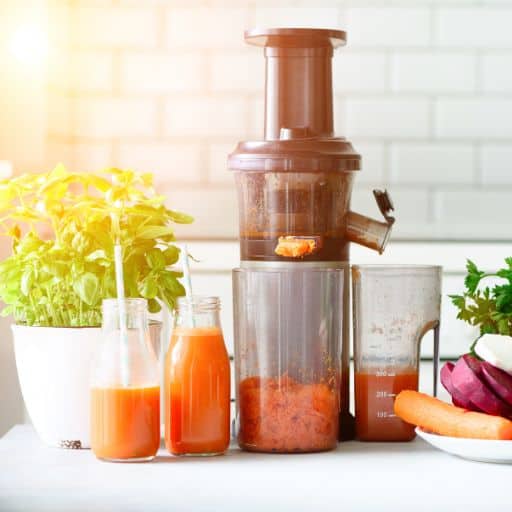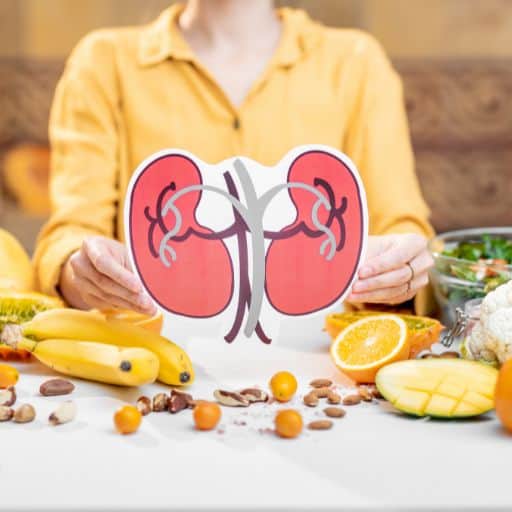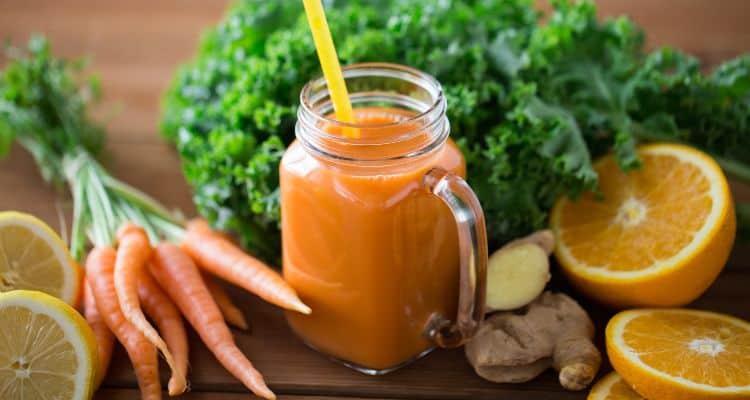Looking to improve your kidney health naturally? Look no further than your local grocery store. Carrot juice, a nutrient-rich vegetable drink, may be a key addition to your diet to boost kidney function.
Despite its sweet taste, carrot juice, a nutritious vegetable juice, is relatively low in sugar and high in essential vitamins, minerals, and antioxidants. Research has linked the intake of carrot juice to several health benefits, including improved digestion, enhanced immune function, and even cancer prevention. Its high nutrition content makes it one of the most recommended juices for optimal health.
But what about liver and kidney health? Some studies suggest that drinking carrot juice regularly may positively impact these vital organs due to its high content of antioxidants, vitamins, and other beneficial juices. Let’s look at the benefits of adding carrot juice to your diet.
The Benefits of Drinking Carrot Juice for Kidney Health

Drinking carrot juice as part of a healthy diet can provide numerous healing benefits for kidney and liver health. Carrots are a great source of antioxidants, vitamins, and minerals essential for maintaining good health.
The kidneys play a crucial role in removing waste and toxins from the body, so keeping them healthy is important. Adding cilantro to your carrot juice can also provide additional benefits for liver and kidney health.
Here are some ways that drinking carrot juice can benefit your kidneys and liver:
Rich in Antioxidants
Carrot juice is a great source of antioxidants that can help protect the kidneys from damage. In addition, drinking carrot juice offers numerous health benefits as it contains essential vitamins and minerals that are vital for a healthy diet. To add more flavor and nutrients, consider adding cilantro to your carrot juice.
Antioxidants, including vitamins, are molecules that neutralize harmful free radicals in the body. They can be found in various foods and supplements, making a healthy diet crucial for numerous health benefits. Antioxidants play a vital role in healing and preventing oxidative stress and damage to cells caused by environmental pollutants and processed foods.
Over time, antioxidants can provide numerous health benefits and aid in healing, while inflammation and tissue damage throughout the body, including in the kidneys, can negatively impact skin health.
This damage can lead to chronic diseases like kidney disease, cancer, and heart disease. Drinking carrot juice regularly can offer numerous health benefits as it is rich in antioxidants and vitamins. It can help reduce oxidative stress and inflammation, making it a great addition to your diet.
Supports Kidney Function
The health benefits of carrot juice extend beyond just supporting kidney function, as it also contains skin-nourishing vitamin A and potassium. Adding cilantro to the mix can further enhance its nutritional value.
Vitamin A is essential for maintaining healthy tissues and organs, including the kidneys.
Potassium and vitamin help regulate blood pressure and fluid balance, which is important for kidney function.
A study published in the Journal of Agricultural Food Chemistry found that drinking carrot juice reduced oxidative stress and inflammation in rats with diabetes-induced kidney disease.
While more research is needed on humans, this study suggests that drinking carrot juice, which is rich in vitamin A, may have similar benefits for people at risk of developing kidney disease.
Natural Diuretic
Carrot juice is a natural diuretic that can help increase urine output and reduce fluid retention in the body. This can benefit individuals with kidney disease who may struggle with excess fluid buildup or swelling. Additionally, carrot juice is a rich source of vitamins, making it a nutritious drink option for overall health.
Overall, there are many reasons why adding carrot juice to your diet could benefit your kidneys. However, as with any dietary change or supplement regimen, it’s important to speak with your healthcare provider before making any significant changes.
Good Source of Potassium for Those With Healthy Kidney Function
Potassium is an essential mineral that plays a crucial role in maintaining healthy kidneys. It helps regulate fluid balance, blood pressure, and electrolyte levels. Chronic kidney disease patients often have low potassium levels, which can lead to various complications.
Carrot juice is an excellent source of potassium, with one cup providing approximately 15% of the daily recommended intake. Regular consumption of carrot juice can help individuals with kidney disease maintain healthy potassium levels and improve overall kidney function.
Animal Studies Suggest Healing Effects on Kidneys
Several animal studies have shown that carrot juice may heal the kidneys. A study published in Food & Function evaluated the effect of carrot juice on renal function in rats with induced kidney damage. The results showed that regular consumption of carrot juice significantly improved various markers of kidney function, including serum creatinine and urea levels.
Another study published in the Journal of Medicinal Food investigated the effect of carrot extract on kidney health and diabetic nephropathy in mice, which could benefit kidney patients with chronic kidney disease and kidney stones. The results showed that treatment with carrot extract significantly improved renal function and reduced oxidative stress in diabetic mice.
While these studies were conducted on animals, they provide promising evidence for the potential benefits of carrot juice for individuals with kidney disease.
Antioxidant Properties of Carrot Juice for Renal Health

The Richness of Beta Carotene in Carrot Juice
Beta carotene is a type of carotenoid that gives carrots their orange color. It is also an antioxidant that helps protect cells from damage caused by free radicals. beta carotene plays an important role in protecting the kidneys from oxidative stress.
Studies have shown that beta carotene can help reduce oxidative stress in the kidneys and prevent kidney damage. Regular consumption of carrot juice may help increase the levels of beta carotene in your body, giving you better protection against oxidative stress.
Essential Nutrients Found in Carrot Juice
Aside from beta-carotene, carrot juice contains other essential nutrients for kidney function and preventing kidney stones. These include vitamins A and C, potassium, fiber, and folate.
Vitamin A is important for maintaining healthy vision and skin. It also plays a role in regulating immune function and gene expression. Vitamin C, an antioxidant that helps protect cells from damage caused by free radicals, is beneficial in preventing kidney stones.
Potassium helps regulate blood pressure and fluid balance in the body, which is important for kidney health and kidney function.
Fiber aids digestion and promotes bowel regularity, while folate supports cell growth and development. All these nutrients work together to support overall renal health and kidney function.
Carrot Juice is Not For Those With Kidney Problems or Chronic Kidney Disease

While carrots are a nutritious vegetable, they may not be the best choice for those with kidney disease. Here’s why:
Carrots contain high levels of potassium
While carrots are often touted as a healthy food choice, they have some downsides. For example, carrots contain high levels of potassium which can affect kidney function.
While potassium is essential for overall health, too much of this mineral can harm those with kidney disease.
When the kidneys are not functioning properly, they may not be able to effectively remove excess potassium from the body.
Carrots are high in oxalates
Another downside of carrots. Oxalates are compounds in many plant-based foods that can contribute to kidney stone formation.
For those prone to developing kidney stones or who already have them, consuming large amounts of carrots or carrot juice could potentially exacerbate this issue.
Tips for Incorporating Carrot Juice into a Kidney-Friendly Diet
If you want to incorporate carrot juice into your kidney-friendly diet, there are a few things to remember. While carrot juice is generally considered healthy, it can be high in potassium and sugar, which can be problematic for those with kidney disease.
Here are some tips to help you enjoy the benefits of carrot juice without compromising your kidney health.
Dilute Carrot Juice with Water
One easy way to reduce carrot juice’s potassium and sugar content is to dilute it with water. This not only helps make the juice more kidney-friendly but also helps stretch your supply of carrots further.
Mix up to 4 ounces of fresh carrot juice with water to support kidney health and function. Adjust the ratio according to your taste preference to dilute your carrot juice, but stick to no more than 4 ounces daily for optimal kidney health.
Use Fresh Carrots
It’s best to use fresh carrots rather than canned or bottled versions when making carrot juice, as it can improve kidney function and promote kidney health.
Fresh carrots are a great option for those concerned about their kidney function, as they are lower in sodium and have fewer additives, making them a healthier choice overall.
Fresh carrots have a higher nutrient content than processed versions, which can benefit kidney health and function, so you’ll get more nutritional bang for your buck.
Limit Your Intake
While drinking carrot juice can provide many health benefits, it’s important not to overdo it. Drinking too much carrot juice can lead to excess oxalate buildup in the body, contributing to kidney stones and other complications.
To maintain good kidney function and kidney health, limit your intake of carrot juice to no more than 1/2 cup per day.
Add Kidney-Friendly Ingredients
To boost the nutritional value of your carrot juice while still keeping it kidney-friendly, consider adding other ingredients like ginger or lemon.
Ginger has anti-inflammatory properties that can help reduce kidney inflammation and improve overall kidney function.
Lemon is high in vitamin C and citric acid, which can help prevent kidney stones from forming.
Video of a Kidney Disease Friendly Juice
Here is a delicious juice recipe that is suitable for a patient with chronic kidney disease:
The ingredients in this juice are:
- 1/4 large cucumber
- 1/4 large/medium carrot
- 1/4 large apple
- 4 stalks of celery
- 1 tsp of moringa powder
The juicer used is the Omega J8006. Alternatively, take a look at my post on the best juicers for carrots.
Consult with a Healthcare Professional
Before incorporating carrot juice into your kidney-friendly diet, it’s important to consult with a healthcare professional.
They can help you determine the appropriate amount of carrot juice based on your needs and health status. They can guide other dietary changes that may be necessary to support kidney health.
Conclusion: Is Carrot Juice Good for Kidneys?
It’s important to remember that while carrot juice may benefit kidney health, it should not be used as a replacement for medical treatment or advice from a healthcare professional.
If you suffer from kidney problems, including kidney failure, avoid concentrated carrot juice until you have spoken with your kidney specialist. They will be able to offer personalized advice for kidney patients, based on your current kidney health.
Drinking carrot juice can be a simple and delicious way to support healthy kidneys. So go ahead and enjoy this tasty beverage while reaping its many benefits!


